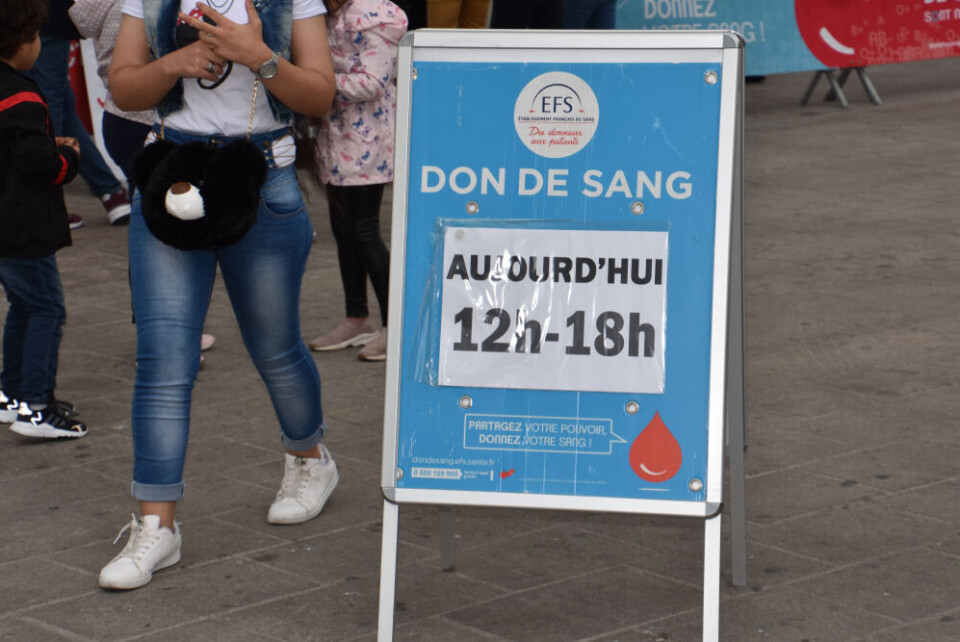-
Funeral held in Normandy for last Native American soldier to survive D-Day landings
Charles Norman Shay was among first to land on Omaha beach and a recipient of Silver Star and Legion of Honour medals
-
Visual: how healthy do French people think they are?
Progress in smoking rates but more than one in five people polled say they feel they drink excessively
-
Lost cat reunited with French family after 11 years thanks to identification tattoo
Shelter discovered injured elderly cat had identification tattoo which helped to track down previous owners
British people can give blood in France (just not for transfusions)
Blood of people who were in the UK between 1980 and 1996 for over a year can instead be used for scientific research. There are other ways to help too

Today (March 16) is a historic day for blood donations in France as the last restriction on homosexual men giving blood is removed.
The rule that gay men could not give blood if they had had sexual relations in the past four months has been ended, and the sexual orientation question has been removed from France’s blood donation eligibility questionaire.
Read more:France to lift blood donation ban for gay men who have had recent sex
However, one factor that does still disqualify someone from giving blood is if they spent over one year in total in the UK between January 1, 1980, and December 31, 1996. This is regardless of nationality and is due to an outbreak of mad cow disease (Creutzfeldt-Jakob Disease) in the UK at the time.
The outbreak of the disease, also known as bovine spongiform encephalopathy (BSE), caused the deaths of 177 people – who died after eating infected beef – and also led to the slaughter of millions of cows.
France introduced this blood donation ban in 2000 but people affected by this ban can still help the blood donation effort in France in other ways.
Read more:Giving blood: When will France end ban over UK’s 1980s BSE outbreak?
How can people who are not allowed to donate blood help in France?
Give your blood for scientific use
The first way is by donating your blood for non-therapeutic use (un don à usage non thérapeutique). This means your blood can be used for biological analyses, scientific research or to help train health professionals in universities or secondary schools.
While it means your blood is not directly used for transfusions or to help patients in emergency situations, it is still a vital donation as it helps research and training. It may also save blood that can be used in transfusions from this.
To make this kind of donation, contact your nearest blood donation centre.
Make a donation (money not blood)
You can also financially support the Fédération française pour le don de sang bénévole (FFDSB), an umbrella association grouping around 2,850 smaller blood donation volunteer associations.
Its mission is to encourage voluntary donation among the population but also to bring together associations working in support of blood donation.
You can also claim 66% of your donation back when you declare your taxes.
See this page to make a financial donation.
Become a volunteer and donate your time (not blood)
You can sign up to become a volunteer with FFDSB.
Their daily activities include:
- Promoting blood donation in schools
- Distributing leaflets and raising awareness among the general public
- Creating events (marathons, concerts, fairs, etc.).
- Helping the Etablissement français du sang (EFS) to organise blood drives by contacting municipalities.
- Representing the EFS in dealings with public authorities.
Being a volunteer will likely require you having at least moderately good French.
However, the EFS says that you can also help by being an “ambassador”. This just means talking to your friends, family or colleagues about the advantages of giving blood. They also suggest supporting blood donation drives on social media, and engaging with campaigns, such as the Missing Type campaign.
Read our article on the Missing Type campaign here: French blood service encourages donations through MissingType campaign
The EFS also advertises the role of “mobiliers”, who go out and spread the word about the importance of donating blood. This role is mainly aimed at young workers, students and activists.
Why can people who lived in the UK in the 80s and 90s not give blood in France?
Creutzfeldt–Jakob disease (CJD) is a fatal degenerative brain disorder and can remain dormant in a person for decades.
There is no test to determine whether someone has the disease.
In 2013, a report found that one in 2,000 people in the UK were carrying the disease, the BBC reported.
Another report published the following year stated that “tens of thousands” of people in the UK could have it, and blood transfusions were highlighted as a key way it was being spread.
Richard Knight, a professor of clinical Neurology who is involved in the National CJD Research and Surveillance Unit, said that it is not known how many people in the UK are infected with the disease.
“Every prediction that we have suggests that there are going to be further cases,” he told the BBC in 2019.
Colin Smith, professor of neuropathology at the University of Edinburgh, said that he believed the number of outstanding cases is likely to be relatively small.
Can people who live / lived in France donate blood in the UK?
Yes. The Connexion has heard from people claiming that those who were in France in the 80s and 90s cannot give blood in the UK due to the BSE outbreak, but this is not the case.
You can see the NHS’s checklist for who can give blood in the UK at this link here.
Related stories
Can British people banned from giving blood in France be organ donors?
























